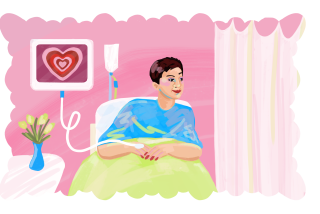One foot on the other shore, and the man in the dark suit was holding a hand
- Share via
Once again, I feel obliged to explain my absence.
This time I have been far away. I have been to oblivion and back.
You may have kept up with the bulletins printed from time to time on this page, reporting that I had suffered a heart attack, and was recovering, and would be back.
True enough, as far as they went, and here I am.
It began on Sunday, Dec. 16. I was at home watching a football game on television. I was in the bedroom, on my electric bed, reading the paper and drinking black coffee and watching the game--my usual routine on a Sunday morning in football season.
My wife was in her bathroom, feeding her birds.
Suddenly I started coughing and felt short of breath. With each breath it grew shorter. I cried out to my wife. I told her to call the doctor.
She led me to the kitchen to be by her while she called on the wall phone. She got his answering service. They were trying to reach him. I was growing worse.
“You hold this,” she said,” handing me the phone, “in case he comes on. I’m going to call the paramedics.”
She went into my den to use our other line.
She got back and took the phone from me before the doctor came on. Then she was talking to him, telling him she had already called the paramedics. “Yes, yes,” she said. “All right.”
She said he’d be waiting for us at the Huntington.
I was gasping for every breath. She led me to the couch by the front door and opened the door and we waited.
I grew weaker by the moment. I couldn’t think. I toppled over.
She grabbed me and held me up and said, “Hold on, Jack, oh, hold on!”
She kept holding me, saying, “Why don’t they come!” Finally she cried, “Hold on, Jack, Oh God, hold on! I can hear the siren--they’re coming!”
From there things merge into blackness for me. I faintly remember being taken up in a man’s arms. They said later, on their chart, that I was talking. But I don’t remember anything. Not even the ambulance ride. Not even the siren.
I don’t remember anything of the next two days.
Piecing it together from the charts, and from my family’s recollections, and some of the doctors and nurses, this is what happened.
First to arrive at our house was a fire truck. My wife can’t remember what they did to me, but they had come, evidently, because there are more fire stations than paramedic stations, and they have a better chance of getting there first. In a minute or so the paramedics arrived.
My wife told them they were waiting for me at Huntington, but they said they had to take me to the County-USC Medical Center, because it was closer. They couldn’t take her in the ambulance, but the fire truck led her over in her car. (Every time we pass a fire truck today she blows them a kiss.)
On the way to the hospital the paramedics made contact with a nurse who took my symptoms and ordered treatment. When I reached emergency I was described as being in severe respiratory distress. My heart was fibrillating and I went into congestive heart failure. My heart stopped.
Clinically I was still alive; but in a practical sense, I was dead.
The doctor on duty ordered electrical shock treatment to restore my heartbeat. Two metal plates were placed on my chest and I was given two jolts of 200 watts each. My heart began to beat again in a regular rhythm.
Finally I was moved up to the intensive care unit, where my wife was first able to see me. I wasn’t much to see. I was described on the charts as cold and blue, with no response to stimuli and no palpable pulses; my extremities were extended and my fists clenched. My eyes were closed.
Somewhere along here, with my wife’s signed permission, they inserted an arterial pump in my leg, to assist my heart in pumping blood.
For six hours I was comatose. For all I knew, I was dead. One foot was on the other shore, and the man in the dark suit had hold of one of my hands.
I remember absolutely nothing of this period. No soft lights. No golden horizons. No heavenly Muzak. No angels singing. I don’t remember it, but when I opened my eyes my wife was standing at my bedside holding one of my clenched hands, and my son Curt was holding the other. They said I opened my eyes and squeezed their hands, and they knew I had come back.
My recovery was remarkable. I remained in intensive care with my artificial heart pumping in my leg and a dozen tubes delivering and relieving me of various fluids, and deprived of my only weapon--my power of speech. A tube ran down past my voice box and into my lungs to keep me in oxygen.
A nurse noted on her chart: “Patient awake, alert & oriented. Responds appropriately to verbal questions. Communicates with writing pad. Nods head and attempts to talk frequently.”
On the following Friday they decided I was stable enough to move out of intensive care. The tube had been removed from my mouth, which let me talk, and, according to my daughters-in-law, made me sound like my old impatient, irascible self.
They moved me to Huntington Memorial by ambulance, but I don’t even remember the ride.


